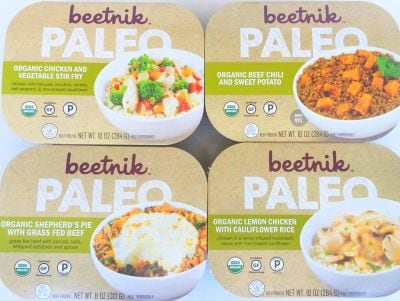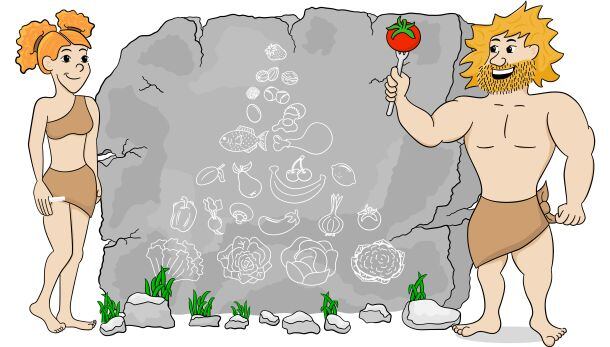When Paleo-certified frozen entrée brand Beetnik launched in 1,700 Walmart stores a few months ago, it was one small testament to how the Paleo diet has gained mass market recognition and appeal, infiltrating conventional channels after its stint exclusively in the natural and organic retail space. Just earlier this decade the Paleo diet was mostly reserved to fitness circles. Today, it’s a household word.
But technically, supermarkets have stocked Paleo-friendly foodstuff for as long as they’ve been around. As the diet’s name suggests, we’re encouraged to eat like our Paleolithic predecessors from circa 2.6 million years ago, eschewing grains, dairy, and legumes.
It gets more difficult to tell which ingredients would’ve been available in the Paleolithic epoch once they’re mixed, processed, and packaged, and a simple sign denoting if a product were paleo or not was what Paleo enthusiast Karen Pendergrass wished were around. In the late 2000s, Pendergrass stumbled upon the paleo community while she was fine-tuning her diet after multiple doctor visits where she said, initially, no healthcare practitioner was able to diagnose what was wrong. Many physicians later, one doctor finally pinpointed a handful of ailments, including PCOS and Celiac's Disease.
Her mom's personal trainer told her about the then embryonic Paleo diet and its community. She tried it, felt better and thought she looked better; she became a vocal advocate of the diet and a co-founder (and today CEO) of The Paleo Foundation.
The organization is the only up-and-running third-party provider of Paleo certification that issues its ‘Certified Paleo’ logo coupled with the slightly less strict 'Paleo Friendly' moniker, which both indicate that the product bearing it is grain-free, legume-free, dairy-free, and free of artificial coloring, preservatives, sweeteners and flavor enhancers, subject to occasional random facility visits and scrutiny on supply chain documents (the full guideline can be seen in PDF form HERE).
Thriving amid criticism
Today the organization’s certification appears on around 1,000 products by mostly small- and medium-sized but widely distributed brands like 4th & Heart Ghee, Caveman Foods, and 4505 Chicharrones.
There’s certainly demand for paleo products. US volume sales of products featuring a ‘grain-free’ claim surged 75.7% in the 52 weeks to July 30, 2016, according to Nielsen Wellness Track data, while the number of applicants seeking certification from the Paleo Foundation has been doubling annually since 2013 (the organization was founded in 2010).
It has thrived amid criticism—the diet has been dismissed as a fad by many media outlets, from Scientific American calling it 'half-baked, to The Guardian saying the diet's proponents are wrong, to Jezebel straight out calling it "bullsh*t". It's also been by large rejected by the scientific community, citing it as too simplistic, and noting how vastly different the crops and livestock we have today are compared to the plants and animals that our Paleolithic ancestors hunted and gathered, to name a few.
In 2015, The Wall Street Journal published two viewpoints on the paleo diet—arguing for it was Kellyann Petrucci, naturopathic physician, certified nutritional consultant and clinical director of Birmingham Wellness Center in Birmingham, who said the diet "helps control weight and lowers risk of cancers." Arguing against it was Marion Nestle, a professor of nutrition, food studies and public health at New York University and author, who said good nutrition involves balance and variety, and that the Paleo diet makes one "lose too much pleasure for dubious benefits."
Requirements for Paleo-Certification drafted with community feedback
Pendergrass told FoodNavigator-USA that the movement’s critics are missing the point. “A lot of people would tell you the paleo diet is the only diet, the optimal diet, the be-all end-all—I would never tell you that,” she said.
She added that the Paleo Foundation’s criteria of what ingredients are allowed for Paleo certification came from the community's multiple voices weighing in through a Facebook group. The foundation's website says that criteria derived from "current research, archaeological records, paleogenetics, sustainability concerns, proposed health benefits, and input from various leading health experts of the Paleo Movement." Experts on board include authors and former biochemist and author Robb Wolf, Canadian author and former medical researcher Sarah Ballantyne, and even a prominent critic of the movement, Men's Health nutrition contributor and author Alan Aragon. Pendergrass herself has no formal background in nutrition, but said that her own personal experience of intolerance from many non-paleolithic ingredients as defined by the foundation is shared by many people, hence the rise in demand for paleo-certified products.
"In my experience, folks that criticize the paleo lifestyle are those that have not tried it for themselves," Brittany Chibe, chief of granola brand Paleo Scavenger (which is Paleo-Certified), told FoodNavigator-USA. "I 'went paleo' over three years ago, not for health reasons, but while training for a half marathon, and I noticed great results almost immediately such as reduced inflammation (I had a chronic ankle injury that went away), more energy, better sleep, etc. and due to that, I never looked back."

The community-based feedback and popular vote system reflects a larger phenomenon in today's food industry—distrust in Big Food, Big AG, and so-called Western Medicine. "I'm not necessarily a favorite for saying this, but I don't think every single person should, or would do best, with a Paleo diet as soon as you take into context the environment, where they live, their budget, their food culture, their heritage," she said. "There are too many factors to determine someone's optimal diet. There are certain individuals that are well adapted, and individuals who are not."
She acknowledged that plenty of people are healthy and thriving without adhering to the Paleo diet, but to the movement’s critics, she thinks it’s unfair to dismiss it as unscientific because, she argued, there is growing evidence. “There’s scientific evidence on both sides. Pull up PubMed,” she said. There isn’t a single person credited as the founder of the diet, but Pendergrass referenced S. Boyd Eaton’s 1985 paper ‘Paleolithic Nutrition—A Consideration of Its Nature and Current Implications’ published in The New England Journal of Medicine as the one that prompted more conversation on the Paleolithic diet today. As its popularity rose, more research has been done, such as one published recently in Nutrients which linked the diet to faster weight loss but lower intake of micronutrients.
Paleo enters the mainstream
“One fundamental issue is there is limited industry alignment and virtually no regulatory alignment on precisely what foods are allowed or disallowed on a Paleo [or] Paleo-Vegan,” Rachel Cheatham, a nutritional biochemist who runs the Foodscape Group consultancy, told FoodNavigator-USA.
“These privately run certification organizations are not regulated, have arguably arbitrary criteria and are about marketing first and foremost,” she said. “For example, based on the Paleo Foundation’s website, a product manufacturer can opt into different certifying levels (beyond the standard one) for increasing annual fees, which then include various social media activation, newsletter placements and related outreach, all of which can be done ever so quickly for an additional ‘rush’ fee. And the fees do add up.”

Big Food companies are starting to embrace the Paleo diet
But despite the waves of criticism and skepticism from established food and nutrition experts such as Nestle and Cheatham, Big Food companies are starting to embrace the paleo diet. General Mills gobbled up Paleo-Certified meat bar company Epic Provisions, and though it may have had more to do with the demand of meat snacks (which the paleo movement helped propel) than it did with catering to a Paleo audience, Pendergrass confirmed that collaboration with bigger food companies are in the works for 2017, and she's ecstatic.
Withholding specific information, Pendergrass hinted: "Some really, really, really big household name companies and corporations are modifying ingredients, making end-caps for Paleo foods, are cold-calling our clients because they have Paleo-Certified ingredients, and some companies are making Paleo product lines."
And though Google Trends reveals a decline of "Paleo Diet" searches, "for whatever reason, new Paleo food products are seeing a stark increase, and companies that were probably not Paleo in the first place are now making products that are Paleo, or buying Paleo companies, which I think is awesome."
Can paleo become passé?
As the scientific argument goes on, branding experts suspect the term “Paleo” itself can soon sound dated, no matter how beneficial a consumer finds the diet.
Back in May, Blake Mitchell, president of Colorado-based food packaging and branding design agency Interact Boulder, told FoodNavigator-USA that “paleo as a term is a fad, but I think the values of paleo—clean eating, eating food from the ground, unprocessed food—are very much here to stay.”
Chicago-based Steve Gaither, president of marketing agency JB Chicago echoed these sentiments. “The benefits of Paleo are on trend to the masses, with the low carbs/low sugars/high fats/high protein,” he said. “It’s better to call out the benefits rather than ‘Paleo,’ from a marketing perspective.”
He thinks that products can be a combination, carrying the benefit call-outs of paleo (low sugar, high protein) with non-Paleo ingredients (he cited ancient grains or almond flour). “Paleo is a limiter while the call-outs have mass appeal!”
How is the average consumer supposed to know which symbols to trust?
Cheatham finds the certification seal problematic. "Ultimately, there is nothing wrong with product promotion, but the idea that any one or many of these privately-run certification symbols may be on pack right next to the USDA organic symbol is beyond troubling," she said.
"How is the average consumer supposed to know which symbols to trust? The rigor, criteria and legitimacy vary wildly. The consumer is bound to get overwhelmed, confused or both, which means the original intent to improve consumer knowledge and increase ease of purchase decision has failed."
But brand-owner Chibe thinks that a certification label is still important to consumers, especially those plugged in to the paleo movement: "I believe that the Paleo certification is important in the eyes of the consumer as the certification acts as another layer of trust," she said. "Consumer rely on third party certifications such as Paleo, gluten free, non-GMO verified, etc. to guarantee that what they are purchasing has been reviewed by trusted certification companies.
"What I've noticed is that most consumers rely on front-of-pack call-outs versus reading ingredient labels."


